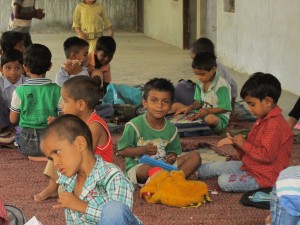I’d never given much thought to Primary Kids Education. I had no recollection whatsoever of my early years schooling and my impression of their education was limited to a separate sleeping time (I admit, I was jealous) and the famous ‘A’ for Apple, ‘B’ for ‘Ball’ song. Imagine my surprise then, when I joined Magic Pathshala, an entire Research and Development division focused solely on educating primary students.
Early years education is today, perhaps, one of the most researched fields among educationist and it’s quite easy to understand their fascination. The human mind is at it’s utmost potential, an untapped, labyrinth resource till the age of six, the “absorbent” mind, as theorists would call it. But having understood this rather widely accepted point, some very disturbing questions have plagued me. Those of us who live in the sanctuary of our cosmopolitan, gated colonies might have high-end access to pre-nursery institutes, day-care facilities and primary schools. But what about the dilapidated, forlorn outskirts that we so easily pity for, and at the same time mercilessly neglect?
“Literacy is not a privilege”. We’ve heard all of them say it, ministers, actors, philosophers, even spiritual gurus. The innumerable number of schemes that the government of India has come up with have been thoroughly criticized either on the basis of the ineptness of their implementation or on the basic ideology behind them altogether. But they must be credited for the kind of statistical progress they have undeniably helped the country achieve. The census in 2011 showed a whopping 9.2% growth in Literacy in a decade. It is a matter of pride and without a doubt a huge leap forward. Further, the TOI survey in the same year showed that 96.5% of all children aged 6-14 years were enrolled in schools. But are these statistics enough? The sad truth is that no one tried to look beyond. The vision of the nation was blurred by statistics as common men and leaders, alike, never understood that merely going to a school did not mean that kids were being educated.
Testimony to the same are the various news channel exposes, which show that Sunday’s new spelling is “S-A-N-D-E” according to a teacher in Bihar or simply the fact that there are fewer committed teachers and an absolute lack of proper text books and learning material in the schools. Hidden behind the ‘average’ figures that paint a rosy picture of universalisation, retention and attendance, is the actual stark reality. Student attendance figures are quite worrisome at a mere 65%. It’s quite understandable why students wouldn’t show up in a class when one takes a look at the teacher attendance which itself ranges from 62%-80%.
Majority of India still lives in villages and so the topic of rural education in India is of utmost importance. It has been talked and debated over, bashed about perhaps a million times. But what is most important remains surprisingly neglected. The process of education itself needs to be made interesting. Schools must make learning not just a factually informative space but also a place of fun, nourishment, interaction and an avenue for expansion of horizons and imagination. Everyday the child goes to school should be an adventure, which he might not find anywhere else. Aiming to achieve the same is Magic Pathshala, an online depository of frequently updated material that can be used by teachers, parents and students to make learning an altogether different experience in contrast to the mundane classroom. It’s interactive, kid-friendly and frankly, lovable characters made me laugh, sing and dance along, as I wondered if schooling could actually be reinvented in a way that parents would not need to drag their kids out of bed everyday.

